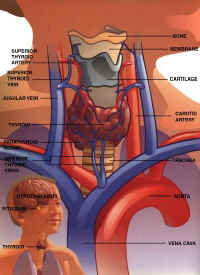Thyroid Gland
 The thyroid gland is located at the base of the throat, in front of the windpipe. A part of the endocrine system, the thyroid produces chemical messengers called hormones that affect many cells of the body.
The thyroid gland is located at the base of the throat, in front of the windpipe. A part of the endocrine system, the thyroid produces chemical messengers called hormones that affect many cells of the body.
Thyroid hormones affect the growth rate and metabolism of body cells. Metabolism refers to how fast or slow the body uses energy. Thyroid hormones are needed for normal mental and physical development, energy and heat, digestion, and healthy skin and hair.
Within the thyroid gland are a number of small glands called parathyroid glands. They produce a hormone that works to control the amount of calcium in the blood. Proper amounts of calcium are needed for normal nerve and muscle function and bone metabolism.
When things go wrong
Normally, a feedback system keeps hormones well regulated. A high amount of hormone in the blood sends a signal back to the gland to make less. When the hormone level in the blood drops, the feedback decreases, allowing the gland to begin making more hormone. In a system so complex, many things can go wrong.
Too much thyroid horn-tone, a condition called hyperthyroidism, speeds up many body processes, including the rate of metabolism, and may lead to increased growth rate. Symptoms may include, nervousness, restlessness, excitability, increased appetite weight loss, feeling too warm, bulging eyes, and rapid heartbeat.
Too little thyroid hormone secretion, a condition called, hypothyroidism, slows down metabolism and may result in poor growth rate. Possible symptoms include feeling tired and cold, loss of appetite, constipation, dry hair and skin, hair loss, numbness and tingling in the hands and feet, short stature, delayed mental development, and slow or confused thinking.
Both high and low thyroid levels can cause an enlarged thyroid gland. The enlarged gland is called a goiter.
Correcting hormone imbalance
Fortunately, hormone imbalances can often be corrected. Low hormone levels can be brought up to normal with synthetic hormones that work just like the ones the body makes naturally. If hormone levels are too high, antithyroid drugs can be used to lower hormone production. Hormone levels should be tested regularly and doses adjusted to maintain proper balance. An overactive thyroid may also be treated with radioactive iodine. Another treatment is an operation to remove part or all of the thyroid gland. This is seldom done in children.
Special considerations
Those affected by thyroid hormone imbalance may have growth and development, or school performance problems, or both. This may lead to emotional upsets and”Problems with behavior.
It is usually best to get help from medical professionals who specialize in disorders of the endocrine system. They can provide medical care, information, practical advice, and help with emotional and social concerns.
Thyroid gland
- Gland is normally located at the base of the throat, curving around the windpipe
- Thyroid hormones have widespread effects
- Thyroxine (T4) and triiodothyronine (T3) – stimulate metabolism in all body tissues and promote growth
- Parathyroids, glands embedded within the thyroid, produce another hormone
- Parathyroid Hormone (PTH) – stimulates release of calcium from bone and reabsorption of calcium by the kidneys
Disorders and clinical features
Overactive thyroid (hyperthyroidism, Gravesdisease)
-
-
- Nervousness, restlessness
- Emotional instability
- Heat intolerance
- Increased appetite with weight loss
- Palpitations and rapid heartbeat
- Goiter
-
Underactive thyroid (hypothyroidism, Hoshimotos thyroiditis)
-
-
- Short stature, failure to thrive, slow growth
- Lethargy and fatigue
- Muscle aches
- Cold intolerance
- Decreased appetite
- Dry hair and skin
- Numbness and tingling in extremities
- Goiter
- Affects brain growth
-
Overactive parathyroid (hyperporathyroidism)
-
-
- Brittle bones
- Kidney stones
- Abnormally high calcium and low phosphorus levels in blood
-
Underactive parathyroid (hypoparathyroidism)
-
-
- Muscle twitch, muscle spasms
- Abnormally low calcium and high phosphorus levels in blood
-
Therapy
- Hormone replacement therapy
- Hormone suppression therapy
- Vitamin D and calcium
- Surgery (rarely)
- Calcitonin
Special considerations
- Labile emotions
- School performance
- Body image
